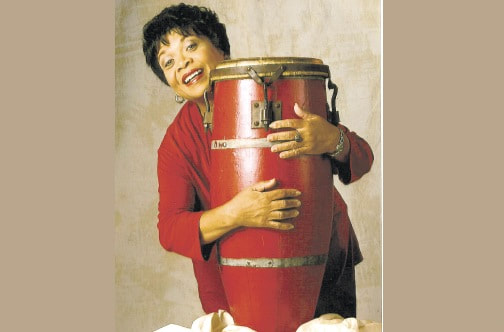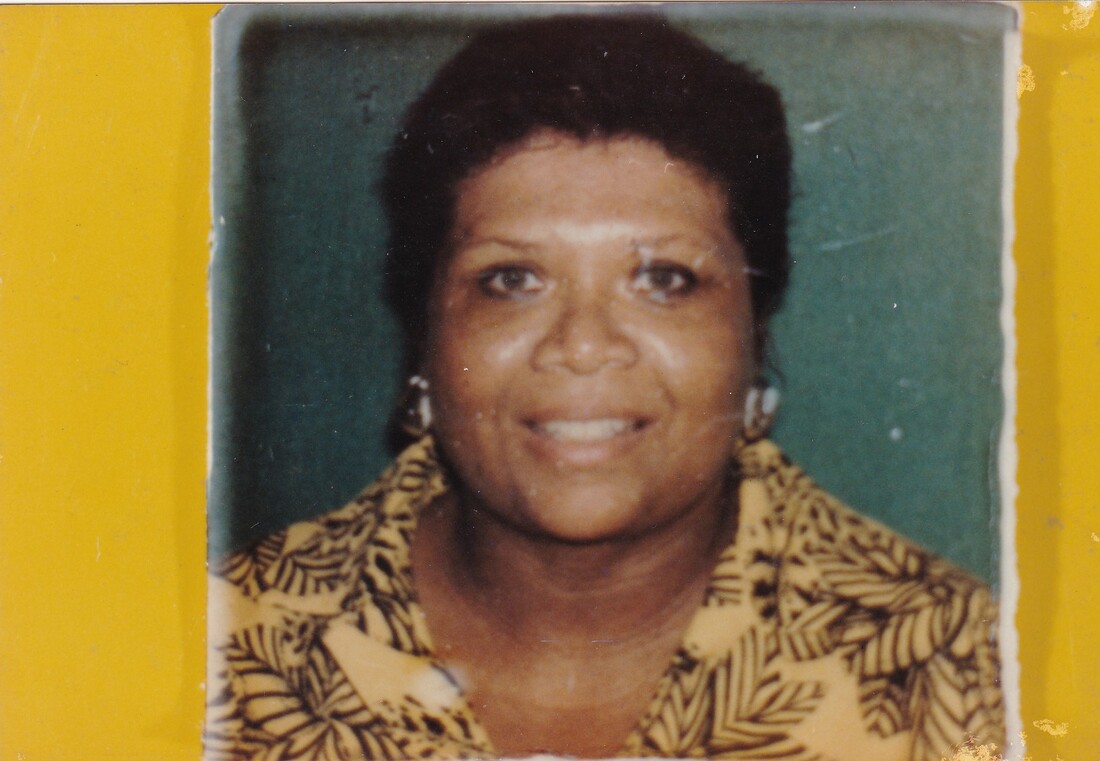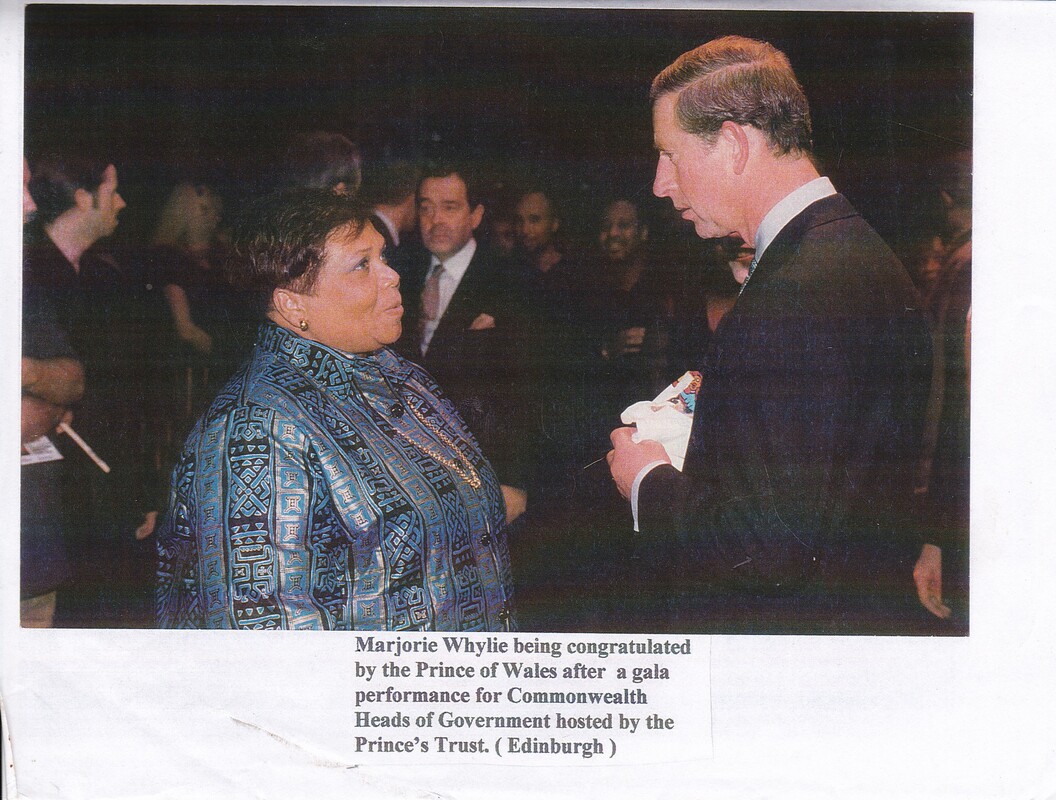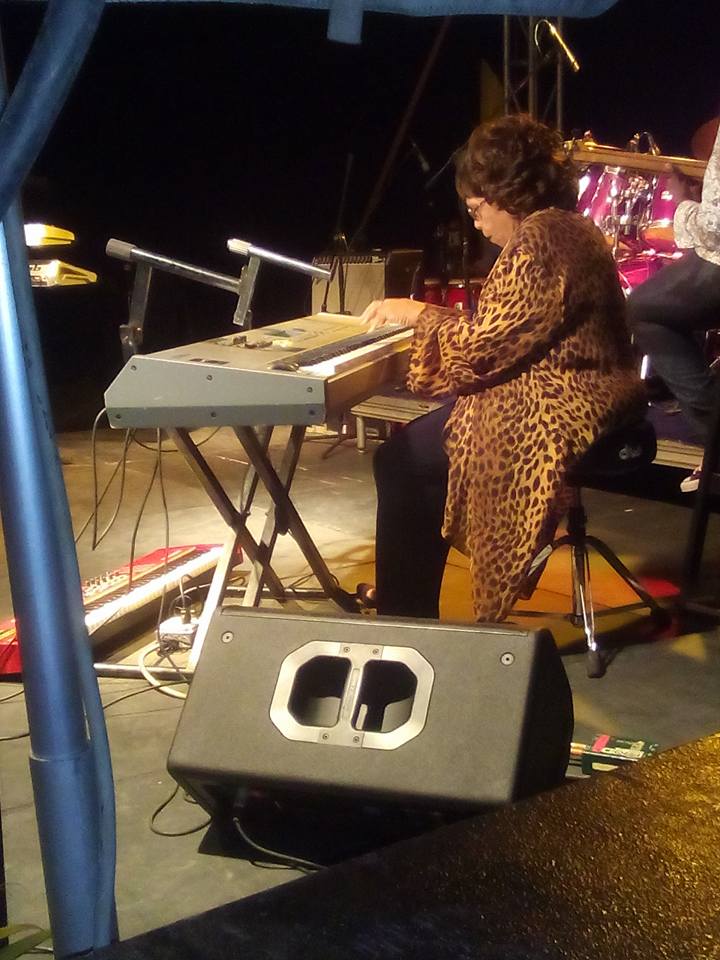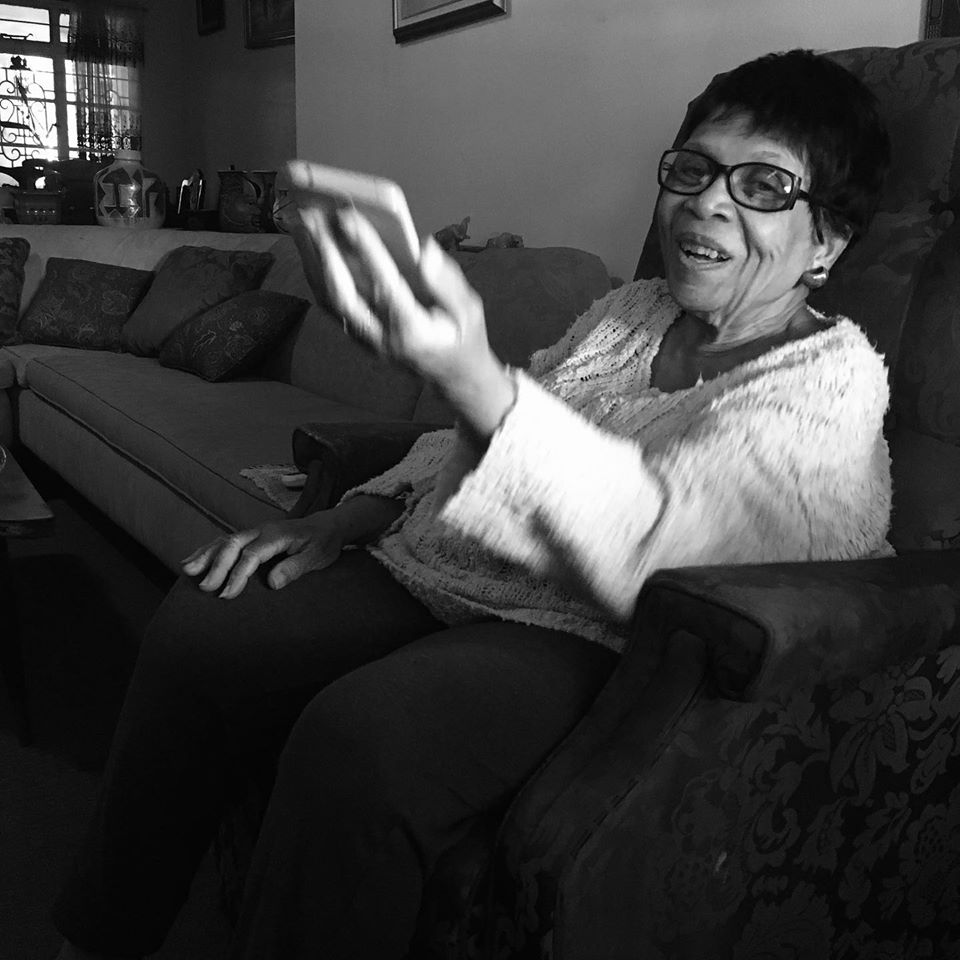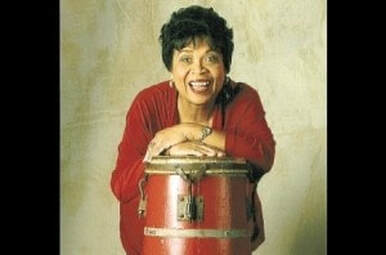Marjorie Arnoldene Gregory Whylie, CD
Composer, Musician, Arranger, Band Leader, Educator, Cultural Researcher
|
Marjorie Whylie, CD is a Jamaican pianist, percussionist and educator who was musical director and now musical director emerita of the world-famous National Dance Theatre Company of Jamaica (NDTC) for 47 years.
Early Years Whylie was a musical prodigy, who began playing piano at two and a half years old, became part of a percussion band at age 5 and started formal music lessons from the age of six with acclaimed Jamaican music teacher Ena Helps. She performed in public from the age of five, and attended St. Andrews High School for Girls from the age of nine after coming first in the island’s primary schools’ scholarship exam and receiving the Jamaica government Code scholarship! She completed the Cambridge School Certificate and Higher Schools’ Certificate examinations and was awarded a teacher scholarship to the University of the West Indies (UWI). Subsequently as a student at the UWI Mona Campus, she played steel pan. Whylie had passed the Royal School of Music Grade 8 exam in piano at the tender age of fifteen. Concurrently, this precocious musician was also doing ballet with Barbara Fonseca, and taking examinations of the Royal Academy of Dance between ages six and fifteen. One memorable music performance at age five had her offering to back Louise Bennet (world famous folklorist, poet and actress) at an event where no piano accompanist was present. “I can play that song,” said the young five-year-old… and play it she did, to the delight of the audience. St Matthews Curtsey Whylie’s home life could be considered charmed, since she was surrounded by music with some of Jamaica’s best performing musicians and music teachers all living within a ½ mile radius of the family home. Her early influences were the music she heard around her, including the recordings of Lord Kitchener and Lord Beginner. She regularly performed at tea parties and at church events, playing songs including standards like Begin the Beguine, as well as popular jazz instrumentals, boogie woogie hits, stride piano favourites and songs like Hold Them Joe and Don’t Touch Mi Tomato, as well as religious and classical music. She was also a regular performer on Lannaman’s Children’s Hour a popular radio programme for talent young performers on Radio Jamaica Limited. Whylie has one of the most interesting and wide-ranging performing educations of any Jamaican musician. At age 15, she joined some of Jamaica’s seminal classical, jazz and pop musicians in the Jazz Workshop organized by Sonny Bradshaw where she rubbed shoulders and learned the craft (Sonny Bradshaw- Jazz Harmony and Repertoire), Taddy Mowatt (Vibes), and band leader Carlos Malcolm (Preliminary Arrangement). She moved on in 1961 to concentrate on the Higher Schools Examination at St Andrew High School for Girls, but it turned out to be a momentary break, as she still played at tea parties and concerts with various groups and as a solo performer. Marjorie has in fact performed with multiple musical aggregations, from big bands to trios, and had her own highly acclaimed group, Whylie Wrhythm, which was formed to play in the Jonkanoo Lounge at the Wyndham Hotel in Kingston. She was also a regular pianist at the Rendezvous Lounge at the Wyndham. Classical Whylie has also performed extensively as a classical pianist, mainly as an accompanist for performances by singers and string players at weddings and church events, but also in her own right as a solo performer. Her debut concert at 15 was at the Lecture Hall of the Institute of Jamaica where she presented a programme of works by her favourite composers: Bach, Beethoven, Chopin and Debussy. She also used her skills as a classical pianist extensively during her lectures and tutorials as Senior lecturer and Head of the Music Unit at the UWI. Musical Performer and Teacher On graduating from St Andrew High School to the University of the West Indies (UWI) as a Spanish Special Honours student, she became part of the University Singers, first as an accompanist and then as a singer, and joined the UWI ESSO Steel Band playing bass pan, the only girl in among eight male members, following in the footsteps of her cousin Shirley. During the summer before entering UWI, she interacted with Rex Nettleford (who she had met small child) and was asked to play for “Roots & Rhythms”, a show mounted at the Little Theater in celebration of Jamaica’s independence in 1962. She was drafted into playing for classes, rehearsals and shows for the fledgling National Dance Theatre (NDTC) while still a student at UWI. At this busy time, Marjorie was simultaneously playing for JIS programmes and making regular television appearances! She never had enough to do and was always tacking on new tasks with enthusiasm. On graduating from UWI, she went to Kingston College (K.C. - high school for boys) as a Spanish and music teacher. At K.C. she taught folk songs from around the world, and introduced the students to music from the great global composers while working tirelessly with their world famous boys’ choir, the Kingston College Chapel Choir. She spent nine years at K.C. As a child she would spend vacations with her aunt in Port Morant where she would hear the music of Kumina and Jonkanoo (African retentions folk and religious forms) without really knowing to what she was listening, but developing an intense interest in the rhythms and beginning to imitate the complex patterns. At the NDTC she was able to learn so drumming technique and Jamaican and Caribbean rhythms from renowned Master Drummer Ronan Critchlow because, fortuitously, there was an available drum. This education followed instruction from Haitian drummer “Ti” Lavinia Williams Yarborough, daughter of Lavinia Williams who conducted a summer course in Haitian Dance for the estramural department of the UWI, headed by Rex Nettleford. |
Whylie sat in at the drum classes and learnt and played rhythms for the classes as well as playing some piano for Neville Blacks’s modern dance classes, composing a short piece “Shaker Ritual” for the final presentation. Whylie also developed her own drum notation system, which is still used today at the Edna Manley College’s School of Music in Kingston. Whylie is well known as a creative innovator and teacher of hand drum technique – traditional rhythms of Jamaica, the Caribbean and Africa.
JCDC
In 1968 Whylie joined the efforts of the Festival Commission (now the Jamaica Cultural Development Commission [JCDC]) as an adjudicator for music. Over the next many decades she also served the JCDC as adjudicator for traditional folk forms, dance, for the annual pop & variety contest and the Festival Song Competition. Later Whylie would mount training seminars for teachers and group leaders mainly focused on traditional forms and music. In the late 80s she worked as a consultant to the Commission for the Performing Arts, writing papers for the Director and on occasion for the Minister with Responsibility for Culture and participating in planning meetings.
NDTC and The Jamaican Folk Singers
Marjorie served the NDTC as pianist, drummer, composer, arranger, becoming Musical Director in 1966, retiring after 47 years. She was also the leader of the acclaimed BDTC Singers following the passing of vocal soloist and original leader Joyce Laylor. During those years she worked also on stage and in the orchestra pit of the National Pantomime of the Little Theatre Movement (LTM) and on the children’s television show Ring Ding where she again worked with the Hon Louise Bennett-Coverley as accompanist, sidekick and show musician.
In 1975 the Jamaican Folk Singers was formed and Marjorie was asked to teach some members of the group drum rhythms. She readily agreed and was invited to be a guest performer on drums as the Folk Singers toured the island and at their debut performance at the Little Theatre. Olive Lewin, who founded the group, was at the time Head of Culture at the Social Development Commission and Marjorie had transcribed some tapes for Dr Lewin as a volunteer.
She became a salaried member of Dr Lewin’s team, was joined by acclaimed actor Oliver Samuels, renowned dancer and choreographer Jackie Guy, and musician and writer Janet Enright. As a team, they travelled the length and breadth of the island researching and teaching folk songs, drum rhythms, movement and drama in youth community centres, correctional institutions and rehabilitation session at the Bellevue Hospital for mental patients. . At the same time Marjorie was also a regular back-up singer for pop sessions at various recording studios.
Jamaica School of Music
In 1978 Marjorie joined the staff of the Jamaica School of Music at the invitation of Pamela O’Gorman then Chairman and appointed by Dr Henry Havergal, to be Head of the Folk Music Research Department. Ms O’Gorman, who had been head of the Music Unit at UWI became Director of the School and began the work of transforming it from a conservatory type entity into an institution intending to satisfy the needs of the society, offering structured course in School Music Teaching, studies in Popular Music and Jazz and transforming the Folk Music Research Department into a Unit encouraging collection, research, analysis and teaching the elements of Jamaican traditional folk forms and the underlying socio-historical and supporting cultural norms. The newly appointed Head of Department was charged with developing a four-year programme for diploma students, which included an introductory first-year and a second year covering cultural practices (required for all certificate students), a third year which included field work and dance, and a fourth year at the end of which a comprehensive research study was to be presented.
The Department also offered classes in basic hand-drumming, folk choir and elementary theatre arts for classroom teachers, often charged with producing and presenting works for JCDC competition. The introductory course Jamaican Studies I was required for all students registered for structural courses regardless of their major. Marjory served first as first as ‘Head of Folk Music Research’, then ‘Director of Studies’ and eventually as ‘Acting Director’ of the school.
Her interest in traditional Jamaican and African music was reflected in her work with the NDTC, with Nettleford describing Whylie's understanding of traditional music as critical to its artistic direction. Her enthusiasm for Jamaican rhythms has been influential in Jamaican music generally. She went on to become Acting Director of the Music Unit at the University of the West Indies, was appointed Senior lecturer and Head of Department in 2001, retiring in 2010. Her duties at UWI included liaising with institutions outside of the Mona Campus, including the Ministry of Education and being a consultant for the Caribbean Examinations Council (CXC).
The Sonny Bradshaw Big Band and all that Jazz
Some two and a half decades after the inception of the Jamaica Big Band, led by multi-instrumentalist, composer, arranger and band leader, C.V. “Sonny” Bradshaw, Whylie was invited to fill the piano chair, which she still does. She became a part of the Committee of Management of The Jamaica International Ocho Rios Jazz Festival which grew out of that big band movement and sought to bring back the popularity that Jazz enjoyed in its heyday. She also performed as part of Bradshaw’s Jazzmobile which performed on an ad hoc basis in hotels, satisfied club dates and conducted workshops in schools. Whylie is currently a member of the Board of Trustee of the Sonny Bradshaw Foundation, established to highlight Mr Bradshaw’s lifetime commitment to the development of Jamaican music and to continue his legacy by encouraging and supporting the playing of horns and the performance of jazz of quality.
The Actor
Whylie firmly believes in a multi-disciplinary approach to the arts and is an accomplished actor. Her one woman show From the Cradle to the Grave drew supportive audiences in performances in Jamaica at the then Phillip Sherlock Centre at the UWI, in Trinidad & Tobago, at the Commonwealth Prime Ministers’ Conference in Edinburugh hosted by Prince Charles the Prince of Wales, and also in Bonn Germany where she performed a programme, representing Jamaica, for the ‘Internationales’ Conference (an organization of global ambassadors), with the first half being comprised of her compositions for piano and the second half being her one woman show.
Current Activities
Whylie has travelled extensively, presenting seminars, workshops, classes and lectures in several countries, including England, Canada, Antigua, The British Virgin Islands, Barbados, St Vincent, Trinidad & Tobago, The Cayman Islands, and Venezuela. Most of these tours included an education component as part of the planned activities as Whylie believes in sharing the knowledge and spreading the message. She conducted classes for the London Arts Council in Britain teaching at the same time in the same class, singers as diverse as opera singers, classical singers, gospel singers and pop singers. In Toronto, she performed a concert for the UWI graduates Toronto chapter and offered lectures for schools on traditional folk music and other cultural forms. Interestingly, her strong teaching methods had her being offered the job of Dean of Discipline at one high school where the Principal was amazed at her command of 700 students.
Whylie has also travelled far and wide throughout the United States, at exhibitions mounted by the Jamaican government, for teaching and lecturing assignments at various schools and as a performer. At one school where the multi-disciplinary approach to the fine arts is a normal part of the curriculum Whylie was presented with portraits of herself painted by her 7-8 year old students as a mobbing parting gift.
Whylie has also been the subject of extensive interviews from Masters and Doctoral candidates from all over the globe. She still receives requests to conduct lectures in large auditoriums and to serve as an external examiner in tertiary institution but has declined such overtures.
Although retired from institutional teaching, consultancies and the rigours of travelling, she keeps her hand in with small workshops in informal settings and classes in voice, piano and drums.
She is particularly interested in music for workshops that reflects the harmonic language, melodic contours and rhythmic complexity of Jamaica and the wider Caribbean and continues her involvement in composing and arranging in several genres. She still performs the occasional jazz presentations.
Composer
Whylie has created quite a collection of compositions, for dance choreography, for stage and for her professional performances. Her musical influences, apart from her favourite classical composers include Don Shirley (a major influence on her composition because he used classical elements and infused the jazz to create a crossover sound), Dave Brukeck, Errol Garner, George Shearing, and good friend, the late Adrian Clarke from Barbados. Marjorie toured widely with the NDTC and in her own right, as well as touring England with world renowned Jamaican jazz pianist Monty Alexander in 1998 and Europe in 1999. In the year 2000 she returned to Europe for Women Take Centre Stage playing with an all-female group One More Than 8 (except for the male bassist), Marjorie being the additional one. She was commissioned to write extensive compositions and arrangements for that tour, which was an acclaimed success and led to a recording session for BBC radio.
Awards
Marjorie Whylie’s first significant awards were the Music Cup at St Andrew High School and Colours and Shield as a UWI student. She was awarded the Order of Distinction - Officer Class (OD) by the Jamaican government, which was later upgraded to Commander Class (CD) in 2015 for her outstanding contribution to the arts. In 1997 she was inducted into the Jamaica Jazz Hall of Fame and in 2004 received the Prime Minister's award for Excellence in Theatre and Music.
She has received four (4) Jamaica Music Industry (JAMI) Awards and an award from the Jamaican Federation of Musicians for Education through Television. She has received awards for adult education, the City of Kingston Award for Music, The Stella Gregory Award from Soroptomists International, The Veuve Clicot Award for Music and a Bronze Musgrave Medal from the Institute of Jamaica.
From the University of the West Indies she has received: The Guild of Graduates Pelican Award; the Phillip Sherlock Centre’s 30th Anniversary Plaque; The University Singers 50th Anniversary Award; The Sir Phillip Sherlock Award 2014; and the Rex Nettleford Foundation Award 2015.
Marjorie Whylie is arguably Jamaica’s finest all-round musician and unquestionably Jamaica’s most versatile proponent of the fine arts, being an expert on so many areas and having performed and participated in such a wide range of crucial (and often pioneering) activities. She remains a hidden treasure of Jamaica Land We Love.
JCDC
In 1968 Whylie joined the efforts of the Festival Commission (now the Jamaica Cultural Development Commission [JCDC]) as an adjudicator for music. Over the next many decades she also served the JCDC as adjudicator for traditional folk forms, dance, for the annual pop & variety contest and the Festival Song Competition. Later Whylie would mount training seminars for teachers and group leaders mainly focused on traditional forms and music. In the late 80s she worked as a consultant to the Commission for the Performing Arts, writing papers for the Director and on occasion for the Minister with Responsibility for Culture and participating in planning meetings.
NDTC and The Jamaican Folk Singers
Marjorie served the NDTC as pianist, drummer, composer, arranger, becoming Musical Director in 1966, retiring after 47 years. She was also the leader of the acclaimed BDTC Singers following the passing of vocal soloist and original leader Joyce Laylor. During those years she worked also on stage and in the orchestra pit of the National Pantomime of the Little Theatre Movement (LTM) and on the children’s television show Ring Ding where she again worked with the Hon Louise Bennett-Coverley as accompanist, sidekick and show musician.
In 1975 the Jamaican Folk Singers was formed and Marjorie was asked to teach some members of the group drum rhythms. She readily agreed and was invited to be a guest performer on drums as the Folk Singers toured the island and at their debut performance at the Little Theatre. Olive Lewin, who founded the group, was at the time Head of Culture at the Social Development Commission and Marjorie had transcribed some tapes for Dr Lewin as a volunteer.
She became a salaried member of Dr Lewin’s team, was joined by acclaimed actor Oliver Samuels, renowned dancer and choreographer Jackie Guy, and musician and writer Janet Enright. As a team, they travelled the length and breadth of the island researching and teaching folk songs, drum rhythms, movement and drama in youth community centres, correctional institutions and rehabilitation session at the Bellevue Hospital for mental patients. . At the same time Marjorie was also a regular back-up singer for pop sessions at various recording studios.
Jamaica School of Music
In 1978 Marjorie joined the staff of the Jamaica School of Music at the invitation of Pamela O’Gorman then Chairman and appointed by Dr Henry Havergal, to be Head of the Folk Music Research Department. Ms O’Gorman, who had been head of the Music Unit at UWI became Director of the School and began the work of transforming it from a conservatory type entity into an institution intending to satisfy the needs of the society, offering structured course in School Music Teaching, studies in Popular Music and Jazz and transforming the Folk Music Research Department into a Unit encouraging collection, research, analysis and teaching the elements of Jamaican traditional folk forms and the underlying socio-historical and supporting cultural norms. The newly appointed Head of Department was charged with developing a four-year programme for diploma students, which included an introductory first-year and a second year covering cultural practices (required for all certificate students), a third year which included field work and dance, and a fourth year at the end of which a comprehensive research study was to be presented.
The Department also offered classes in basic hand-drumming, folk choir and elementary theatre arts for classroom teachers, often charged with producing and presenting works for JCDC competition. The introductory course Jamaican Studies I was required for all students registered for structural courses regardless of their major. Marjory served first as first as ‘Head of Folk Music Research’, then ‘Director of Studies’ and eventually as ‘Acting Director’ of the school.
Her interest in traditional Jamaican and African music was reflected in her work with the NDTC, with Nettleford describing Whylie's understanding of traditional music as critical to its artistic direction. Her enthusiasm for Jamaican rhythms has been influential in Jamaican music generally. She went on to become Acting Director of the Music Unit at the University of the West Indies, was appointed Senior lecturer and Head of Department in 2001, retiring in 2010. Her duties at UWI included liaising with institutions outside of the Mona Campus, including the Ministry of Education and being a consultant for the Caribbean Examinations Council (CXC).
The Sonny Bradshaw Big Band and all that Jazz
Some two and a half decades after the inception of the Jamaica Big Band, led by multi-instrumentalist, composer, arranger and band leader, C.V. “Sonny” Bradshaw, Whylie was invited to fill the piano chair, which she still does. She became a part of the Committee of Management of The Jamaica International Ocho Rios Jazz Festival which grew out of that big band movement and sought to bring back the popularity that Jazz enjoyed in its heyday. She also performed as part of Bradshaw’s Jazzmobile which performed on an ad hoc basis in hotels, satisfied club dates and conducted workshops in schools. Whylie is currently a member of the Board of Trustee of the Sonny Bradshaw Foundation, established to highlight Mr Bradshaw’s lifetime commitment to the development of Jamaican music and to continue his legacy by encouraging and supporting the playing of horns and the performance of jazz of quality.
The Actor
Whylie firmly believes in a multi-disciplinary approach to the arts and is an accomplished actor. Her one woman show From the Cradle to the Grave drew supportive audiences in performances in Jamaica at the then Phillip Sherlock Centre at the UWI, in Trinidad & Tobago, at the Commonwealth Prime Ministers’ Conference in Edinburugh hosted by Prince Charles the Prince of Wales, and also in Bonn Germany where she performed a programme, representing Jamaica, for the ‘Internationales’ Conference (an organization of global ambassadors), with the first half being comprised of her compositions for piano and the second half being her one woman show.
Current Activities
Whylie has travelled extensively, presenting seminars, workshops, classes and lectures in several countries, including England, Canada, Antigua, The British Virgin Islands, Barbados, St Vincent, Trinidad & Tobago, The Cayman Islands, and Venezuela. Most of these tours included an education component as part of the planned activities as Whylie believes in sharing the knowledge and spreading the message. She conducted classes for the London Arts Council in Britain teaching at the same time in the same class, singers as diverse as opera singers, classical singers, gospel singers and pop singers. In Toronto, she performed a concert for the UWI graduates Toronto chapter and offered lectures for schools on traditional folk music and other cultural forms. Interestingly, her strong teaching methods had her being offered the job of Dean of Discipline at one high school where the Principal was amazed at her command of 700 students.
Whylie has also travelled far and wide throughout the United States, at exhibitions mounted by the Jamaican government, for teaching and lecturing assignments at various schools and as a performer. At one school where the multi-disciplinary approach to the fine arts is a normal part of the curriculum Whylie was presented with portraits of herself painted by her 7-8 year old students as a mobbing parting gift.
Whylie has also been the subject of extensive interviews from Masters and Doctoral candidates from all over the globe. She still receives requests to conduct lectures in large auditoriums and to serve as an external examiner in tertiary institution but has declined such overtures.
Although retired from institutional teaching, consultancies and the rigours of travelling, she keeps her hand in with small workshops in informal settings and classes in voice, piano and drums.
She is particularly interested in music for workshops that reflects the harmonic language, melodic contours and rhythmic complexity of Jamaica and the wider Caribbean and continues her involvement in composing and arranging in several genres. She still performs the occasional jazz presentations.
Composer
Whylie has created quite a collection of compositions, for dance choreography, for stage and for her professional performances. Her musical influences, apart from her favourite classical composers include Don Shirley (a major influence on her composition because he used classical elements and infused the jazz to create a crossover sound), Dave Brukeck, Errol Garner, George Shearing, and good friend, the late Adrian Clarke from Barbados. Marjorie toured widely with the NDTC and in her own right, as well as touring England with world renowned Jamaican jazz pianist Monty Alexander in 1998 and Europe in 1999. In the year 2000 she returned to Europe for Women Take Centre Stage playing with an all-female group One More Than 8 (except for the male bassist), Marjorie being the additional one. She was commissioned to write extensive compositions and arrangements for that tour, which was an acclaimed success and led to a recording session for BBC radio.
Awards
Marjorie Whylie’s first significant awards were the Music Cup at St Andrew High School and Colours and Shield as a UWI student. She was awarded the Order of Distinction - Officer Class (OD) by the Jamaican government, which was later upgraded to Commander Class (CD) in 2015 for her outstanding contribution to the arts. In 1997 she was inducted into the Jamaica Jazz Hall of Fame and in 2004 received the Prime Minister's award for Excellence in Theatre and Music.
She has received four (4) Jamaica Music Industry (JAMI) Awards and an award from the Jamaican Federation of Musicians for Education through Television. She has received awards for adult education, the City of Kingston Award for Music, The Stella Gregory Award from Soroptomists International, The Veuve Clicot Award for Music and a Bronze Musgrave Medal from the Institute of Jamaica.
From the University of the West Indies she has received: The Guild of Graduates Pelican Award; the Phillip Sherlock Centre’s 30th Anniversary Plaque; The University Singers 50th Anniversary Award; The Sir Phillip Sherlock Award 2014; and the Rex Nettleford Foundation Award 2015.
Marjorie Whylie is arguably Jamaica’s finest all-round musician and unquestionably Jamaica’s most versatile proponent of the fine arts, being an expert on so many areas and having performed and participated in such a wide range of crucial (and often pioneering) activities. She remains a hidden treasure of Jamaica Land We Love.
MARJORIE WHYLIE
Compositions
FOR UWI Extramural Department – Summer Course in Dance, Choreography by Neville Black
FOR DANCE: NATIONAL DANCE THEATRE COMPANY (NDTC)
FOR UNIVERSITY SINGERS
CHORAL WORKS FOR NDTC SINGERS
FOR JCDC COMPETITIONS
INSTRUMENTAL COMPOSITIONS FOR 9 PIECE BAND AND/OR SMALL COMBO FEATURING KEYBOARD
Compositions
FOR UWI Extramural Department – Summer Course in Dance, Choreography by Neville Black
- 1962: Shaker Ritual – choreography: Neville Black; UWI Summer School in Dance
FOR DANCE: NATIONAL DANCE THEATRE COMPANY (NDTC)
- 1970: Married Story - choreography: Rex Nettleford; traditional and additional music by Marjorie Whylie
- 1970: Shadows - choreography: Sheila Barrett; original music by Marjorie Whylie
- 1972: Celebrations - choreography: Rex Nettleford; traditional arrangement and additional music by Marjorie Whylie
- 1972: Mountain Women - choreography: Sheila Barrett; composition by Marjorie Whylie
- 1973: Thursday’s Child - choreography: Bert Rose; composition by Marjorie Whylie
- 1975: Backlash - choreography Rex Nettleford; composition by Toots Hibbert and Marjorie Whylie
- 1976: Ni, Woman of Destiny - choreography: Sheila Barrett; composition by Marjorie Whylie
- 1977: I Not I - choreography: Sheila Barrett; composition by Marjorie Whylie
- 1978: Elements - choreography: Rex Nettleford, Patsy Ricketts and Jackie Guy; trad. Music, arrangement and additional music by Marjorie Whylie
- 1979: Drumscore - choreography: Rex Nettleford; traditional arrangement and composition by Marjorie Whylie
- 1980: Caribbean Suite - choreography: Bert Rose; traditional arrangement and composition by Marjorie Whylie
- 1981: Rockstone Debate - choreography: Rex Nettleford; music by Bob Marley and Marjorie Whylie
- 1982: Litany - choreography: Rex Nettleford; original composition by Marjorie Whylie including Whylie’s variations of an 18-bar theme by Peter Ashbourne
- 1984: Vibrations - choreography: Rex Nettleford; music by Yaya, Bromfield and Franklyn; additional music by Marjorie Whylie
- 1986: Sanctify - choreography: Rex Nettleford; music by Marjorie Whylie, Keith Francis, Wayne Armond, Peter Tosh, Burning Spear and Bob Marley
- 1987: The Black Widow - choreography: Clive Thompson; music by Marjorie Whylie
- 1988: Caribbean Canvas - choreography: Bert Rose; music by Marjorie Whylie
- 1992: Ancestral Echoes - choreography: Rex Nettleford; music by Handel, McFerrin, Grub Cooper, Ferdel, Olden Lee and Marjorie Whylie
- 1992: Journeys Beyond Survival - choreography: Clive Thompson; music by Marjorie Whylie
- 1996: Blood Canticles – choreography: Rex Nettleford; music by Michael Pluznick, J.S. Bach, Abdullah Ibrahim, Johnny Dyani, Dollar Brand, Lama Gyounne, Jean Phillippe Rykiel and Marjorie Whylie
- 1997: Selah - choreography: Monika Lawrence; music by Marjorie Whylie, Leighton Johnson and Yanni
- 1998: Awakening - choreography: Arelene Richards; music by Mickey Hart and Marjorie Whylie
- 2006: Katrina - choreography: Rex Nettleford; music by Kermit Ruffins, Grub Cooper, Rosamund Johnson, Bessie Smith and Marjorie Whylie; vocals by Barbara Hendricks, Florence Quiver, Ella Audal, LTM Company and NDTC Singers
- 2009: Apocalypse - choreography: Rex Nettleford; music by Marjorie Whylie over dancehall rhythm tracks, Fab Five and Grub Cooper; contemporary gospel by the NDTC Singers
FOR UNIVERSITY SINGERS
- Four Jamaican Nursery Songs
- Mighty God
CHORAL WORKS FOR NDTC SINGERS
- 1976-1991: Mass in A
- 1978: Alleluia
- 1983: Alleluia
- Psalms 23, 84, 98 and 103
- The Lord’s Prayer
- Our Father (a capella)
- Alleluia Amen
- Sing Unto The Lord A New Song
- Songs of Faith
- The Upward Path
- A Time And A Season
- Lord Look At Me
- Songs of Praise
- 1993: O My Jesus
- God Is Working His Purpose Out
- Holy Holy
- Holy Lord God
- Lord You Are The Only One
- Don’t You Know
- The Resurrection
FOR JCDC COMPETITIONS
- Six piano pieces for under 9 and under 12 age groups
INSTRUMENTAL COMPOSITIONS FOR 9 PIECE BAND AND/OR SMALL COMBO FEATURING KEYBOARD
- Ras Marj
- Interlude
- Featherbed Lane
- LabamLambamDibam
- Papine
- Blues In Three
- Adage
- River Of Peace
- Calymento Jam
- Jamma Mamma
- Awobode
- Estudio
- Rocks Grow
- Sensiberra
- Mambimbi
- Jah Blues

